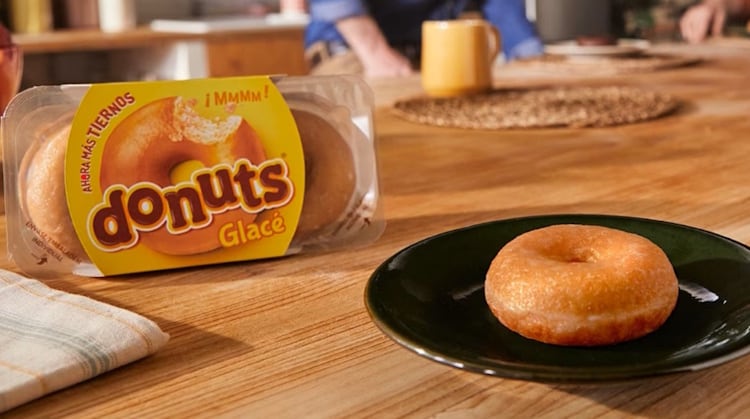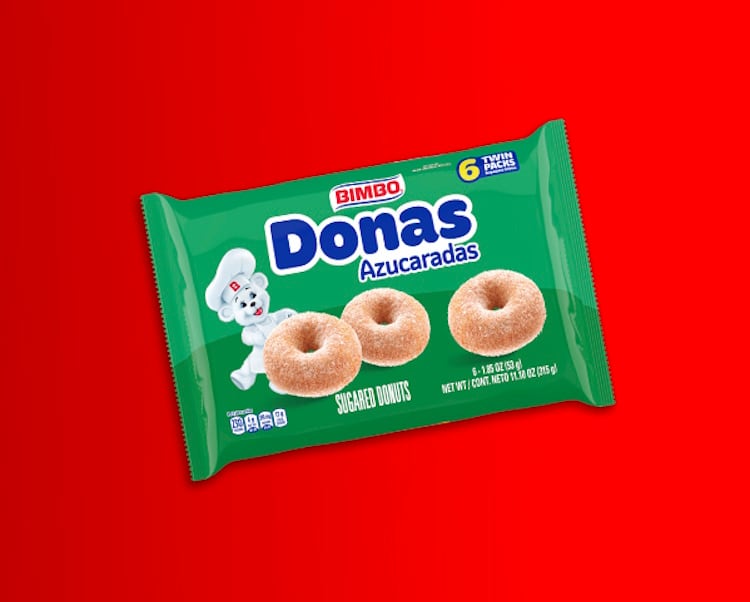Key takeaways:
- Spain’s Supreme Court has ruled that the commercial use of ‘Donut’ belongs exclusively to Grupo Bimbo, even though dónut appears in the dictionary as a generic pastry.
- The decision hinges on consumer association, with judges finding that the spelling ‘Donut/Donuts’ strongly evokes Bimbo’s longtime brand and therefore can’t be used by competitors.
- While the ruling applies only in Spain, it raises wider questions about how far trademark owners can go in claiming everyday food terms as proprietary.
Spain’s seen some strange food fights, but none quite like this. After nearly a decade of litigation, Spain’s Supreme Court has ruled that the word ‘Donut’ belongs exclusively to Grupo Bimbo when used commercially. Not as a recipe. Not as a generic pastry. As a protected, enforceable trademark.
It’s a startling outcome for a word most Spaniards use without a second thought. The Donuts brand, originally created by Panrico, has been part of Spanish bakery culture since the 1960s. When Bimbo acquired Panrico in a deal announced in 2015 and completed in 2016, it didn’t just buy factories and product lines – it bought a national icon. And now, thanks to this ruling, it controls the commercial use of the very word tied to that icon.
The dispute began in 2017, when Bimbo Donuts Iberia sued Atlanta Restauración Temática, a hospitality supplier that marketed frozen pastries described on packaging as ‘donuts’. A lower court in Madrid accepted Atlanta’s argument that dónut – spelled with an accent – appears in the Real Academia Española (RAE) dictionary as a generic pastry. Open-and-shut case, right? Not quite.
The Supreme Court took a different view. It ruled that the commercial use of ‘Donut’ or ‘Donuts’ automatically creates a mental association with Bimbo’s brand – strong enough to amount to trademark infringement even if a company claims to be using the term descriptively. The judges stressed that while dónut sits comfortably in the dictionary, “the inclusion of a trademark in language dictionaries, and its colloquial use, doesn’t limit the exclusive rights of its owner.”
Carlos Tatay, Bimbo’s VP of marketing, called the ruling a clear validation of the brand’s legacy. “This victory isn’t a mere formality,” he said. “It’s the recognition of our daily effort, the undeniable quality and the emotional bond we’ve built with our customers.”
In other words, this isn’t just about a pastry. It’s about identity.
Spain’s other notorious food fights
Paella wars: Valencia has long battled over what counts as 'authentic' paella, with chefs sparring publicly about ingredients from chorizo to peas.
Jamón labeling disputes: Iberian ham producers have fought bitterly over labeling rules for jamón ibérico, including what qualifies as 'pata negra' and how pigs must be raised.
Cheese name protection: Producers of Manchego regularly clash with companies using similar imagery or names for non-Manchega cheeses, triggering multiple legal challenges.
The 'cava' crackdown: Sparkling wine makers outside Catalonia have repeatedly faced legal restrictions over using the protected name 'cava', fueling regional and industry tensions.
Tortilla de patatas wars: Spain’s most heated non-legal debate: whether the classic tortilla should be made with or without onion - a culinary rift that’s practically constitutional.
A nine-year battle over a word and a hole

The lawsuit filed in January 2017 trudged through two lower court decisions, procedural twists and a final appeal that landed on the Supreme Court’s desk almost nine years later. Atlanta argued that its use of ‘donut’ was simply descriptive and aimed at professional hospitality customers who’d never confuse its frozen pastries with Bimbo’s Donuts. Two courts agreed.
But the Supreme Court flipped the script. The justices noted that Atlanta wasn’t using dónut (the generic, accented dictionary word). It was using the exact spelling registered by Bimbo. And that, they said, was what mattered.
If the public, when seeing a word on packaging, instantly thinks of a specific brand, that word isn’t generic. It’s proprietary. The Court found that consumers in Spain overwhelmingly associate ‘Donut’ and ‘Donuts’ with Bimbo’s longstanding brand. That association was enough to tip the case in Bimbo’s favor.
The brand’s history played a huge role. Panrico’s Donuts were a staple of Spanish childhood long before Bimbo entered the picture. That heritage built what the Court called “extraordinary renown.” And extraordinary renown translates into extraordinary protection.
Which leaves competitors with few options besides vocabulary gymnastics.
Does the ruling have international impact?
Legally, no. This ruling applies only within Spain. Practically, though, it’s already sending shockwaves across Europe.
Trademark rights are territorial, so bakeries in the US, the UK or anywhere else can keep selling donuts without losing sleep. But Spain’s ruling sends a message that courts can and will side with brand owners even when words have slipped into everyday usage and straight into the dictionary.
For multinational food companies, especially those with semi-generic brand names, this decision will look like a roadmap. If you can prove strong consumer association, you may be able to reclaim – or defend – words that appear dangerously close to generic.
Cross-border risk is where things get messy. A pastry that’s a safe ‘donut’ in Lisbon could be an infringing ‘Donut’ in Madrid. Compliance teams will need to work harder and small bakeries will need to think twice before copying whatever their US or UK counterparts are doing.
As precedents go, this one has teeth.
Donut vs doughnut vs dónut: who owns which version?

This is where Spain’s pastry politics get interesting.
‘Donut’ and ‘Donuts’ – the unaccented forms – are registered trademarks owned by Bimbo in Spain. Using them commercially for similar products is prohibited.
Lowercase vs uppercase doesn’t matter. Trademark law treats ‘donut’ and ‘Donut’ as the same sign.
Accented dónut is the RAE’s generic word. It’s allowed in everyday speech but risky in commercial settings if used as a product name rather than a description.
The English spelling, doughnut, wasn’t part of the case and is legally safe to use in Spain, though it’s rarely used there.
Spanish generics like rosquilla, berlina, rollo frito, bollo glaseado or pastel de anillo remain fully open.
What the Court cares about isn’t orthography – it’s association. If your pastry label prompts consumers to think of Bimbo’s Donuts, you’re in trouble. If that feels like legal hair-splitting, welcome to modern trademark law.
A nostalgic brand backed by a legal fortress

This ruling cements Bimbo’s position not just as Spain’s biggest packaged bread and pastry producer, but as a powerful defender of legacy brands. It’s a PR win, a legal win and arguably a cultural win.
For everyone else, it’s a headache.
Menus will need rewrites. Labels will need redesigns. Online shops will need fresh SEO. Every foodservice supplier, supermarket bakery counter and café chain in Spain now has to audit its language before Bimbo’s lawyers do it for them.
Critics worry the ruling hands too much linguistic territory to corporations, letting them trademark everyday vocabulary. Supporters say ‘Donuts’ is one of Spain’s most recognizable packaged pastries and letting the term slip into generic oblivion would erode decades of brand building.
Wherever you stand, it’s clear the legal boundary between language and trademarks just shifted. You can still talk about dónuts. You just can’t sell them as ‘donuts’ unless you’re Bimbo.
The case is Bakery Donuts Iberia S.A.U. v. Atlanta Restauración Temática S.L., decided by the Spanish Supreme Court (Civil Chamber) on October 28, 2025.
How Spanish bakers can avoid a trademark slip-up
• Avoid using ‘Donut’ or ‘Donuts’ in any commercial context
• Don’t assume lowercase is safe
• Don’t use phrasing like ‘tipo Donut’ or ‘estilo Donut’ – these can still infringe
• Localize multilingual packaging to remove protected spellings
• Choose clearly generic alternatives (rosquilla, berlina, rollo frito, doughnut)
• When in doubt, treat brand-like words as off-limits


